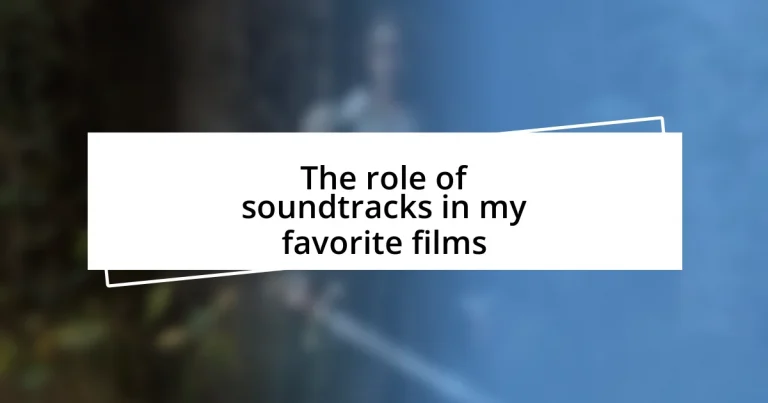Key takeaways:
- Soundtracks enhance emotional engagement, serving as a powerful connection between the audience and the film’s narrative and characters.
- Effective soundtracks utilize thematic consistency, the interplay of music and silence, and precise timing to amplify emotional impact and storytelling.
- Memorable soundtracks become integral to a film’s identity, shaping genre expectations and creating lasting personal connections for viewers.
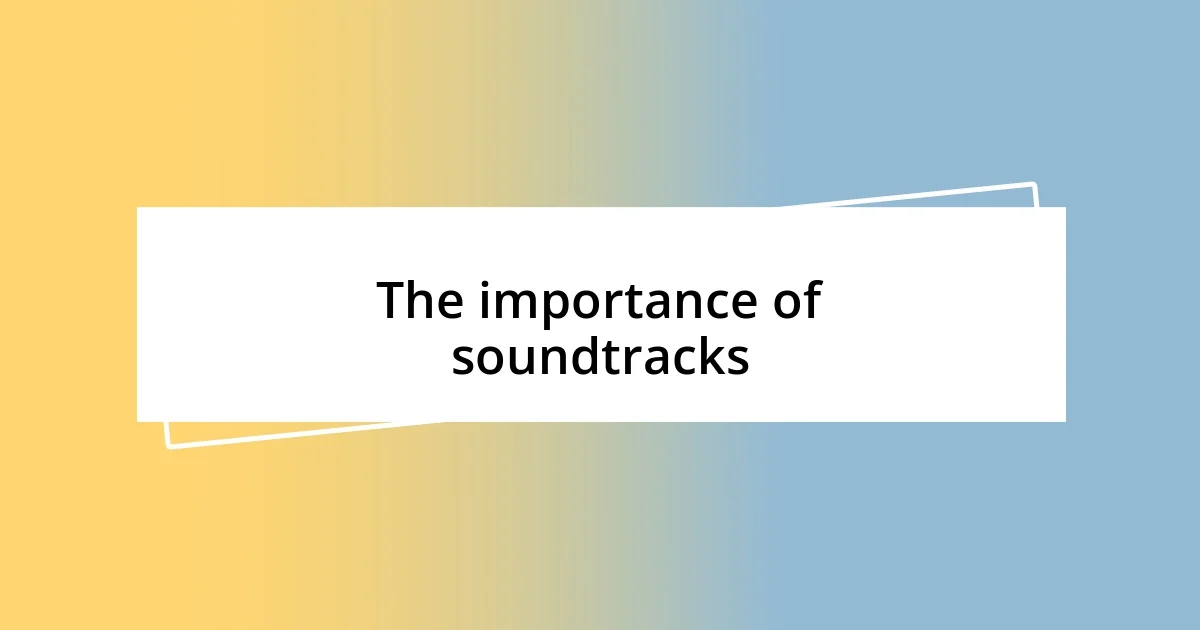
The importance of soundtracks
Soundtracks hold a unique power in film, acting as the emotional backbone that guides our reactions. For me, every time I hear the haunting theme from “Inception,” I’m transported back to the thrilling moments on screen, feeling the same tension and excitement wash over me as when I first watched it. Isn’t it fascinating how a single melody can encapsulate an entire narrative?
In my experience, a well-crafted soundtrack not only enhances the storytelling but also deepens the audience’s connection to the characters. Take “The Shawshank Redemption,” for example; the use of Thomas Newman’s delicate score throughout the film evokes a profound sense of hope and resilience. Can you recall a moment in your life when a particular song resonated with your emotions? That’s how soundtracks work; they amplify our feelings, leaving a lasting impression.
Moreover, soundtracks can evoke nostalgia, reminding us of the time and space where we first encountered a film. I remember watching “Amélie” and the whimsical score by Yann Tiersen instantly took me back to Paris, sparking memories of my own adventures there. Isn’t it remarkable how sound can serve as a time machine, bringing feelings and memories rushing back at a moment’s notice? The importance of soundtracks lies not just in their ability to complement visuals but in their profound capacity to connect us emotionally to both the story and our own lives.
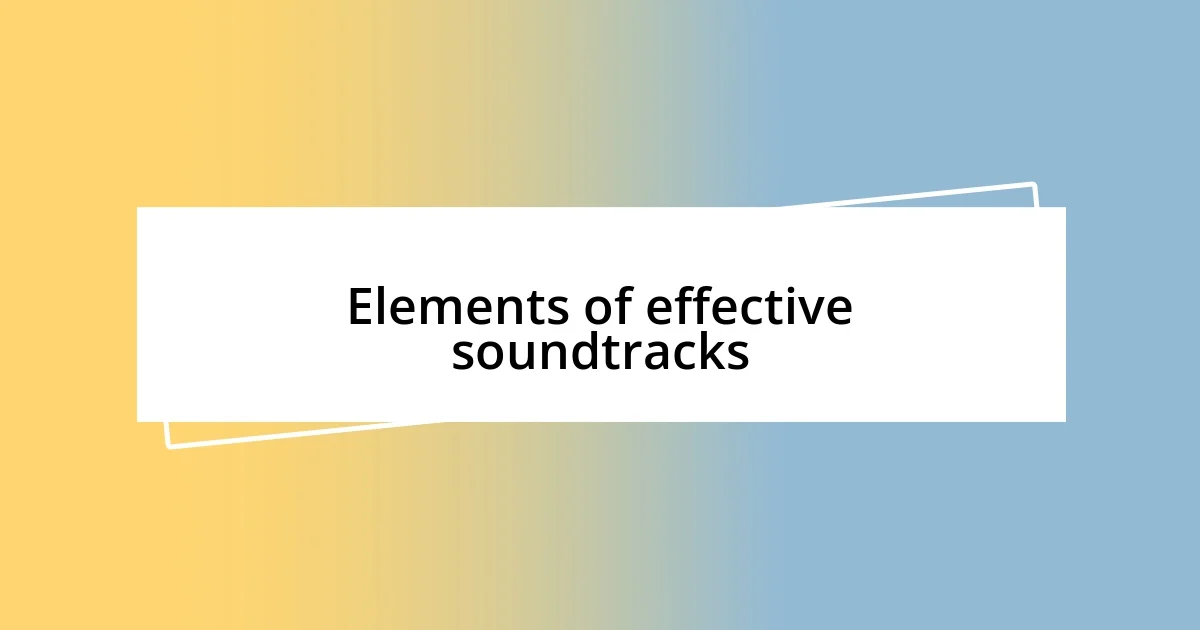
Elements of effective soundtracks
Effective soundtracks consist of various elements that seamlessly intertwine with the film’s narrative. One vital aspect is thematic consistency; I find that when music motifs are used consistently throughout a film, they reinforce the emotional landscape. For instance, when I hear the recurring motifs in “Star Wars,” I’m reminded of the characters’ journeys, making their struggles and triumphs even more impactful.
Another key element is the relationship between music and silence. I remember watching “A Quiet Place” and how the absence of sound heightened my tension. It made the few moments of music stand out even more, creating a fascinating contrast that enhanced the suspense. This interplay of quiet and sound teaches us that sometimes, less is more in communicating emotions.
Lastly, the timing of a soundtrack’s cues can make or break a scene. I often think about the climactic moment in “The Lion King” when the score swells as Simba confronts Scar. It’s one of those instances where the music doesn’t just provide background; it amplifies every ounce of drama. A strong soundtrack aligns perfectly with pivotal moments in a film, elevating them to unforgettable experiences.
| Element | Description |
|---|---|
| Thematic Consistency | Recurring motifs that reinforce emotional connections. |
| Music and Silence | Interplay of sound and absence to enhance tension. |
| Timing | Perfectly timed cues that amplify dramatic moments. |
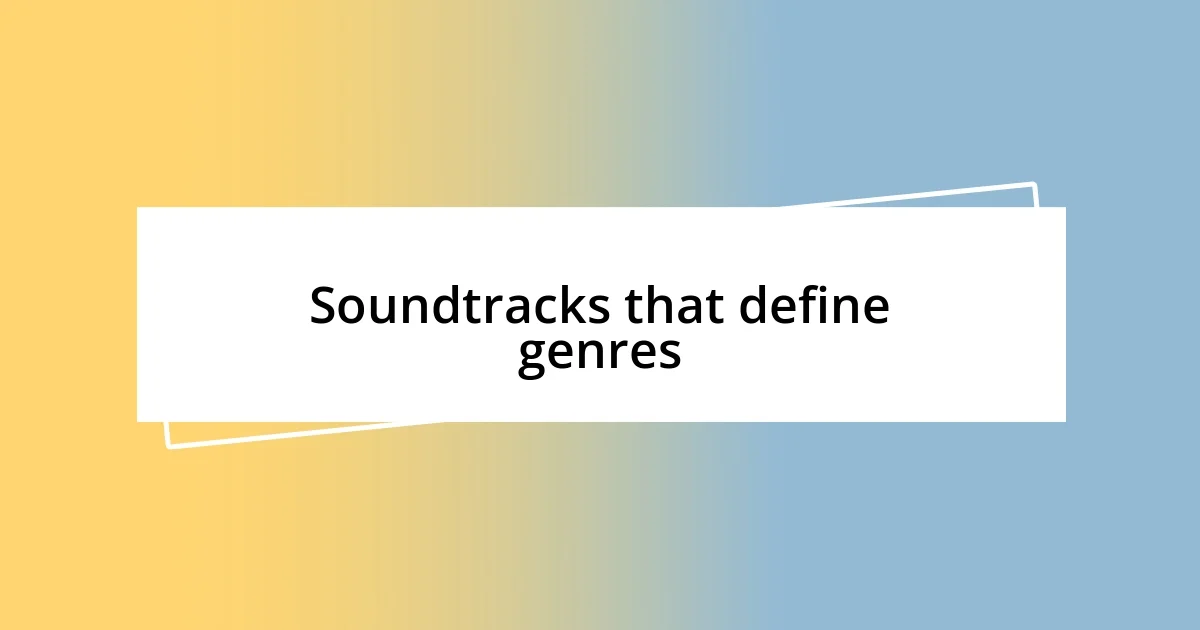
Soundtracks that define genres
Soundtracks often become synonymous with their respective genres, shaping not just the films but also how we perceive the music itself. When I hear the electric guitar riffs from “Pulp Fiction,” I’m immediately taken back to the gritty underworld of crime and the cool, edgy aesthetic of the 90s. This connection between the genre and its signature sound creates a kind of emotional shorthand that makes the entire viewing experience resonate even more powerfully with me.
Here are a few notable soundtracks that encapsulate their genres:
- Horror: The eerie soundscape of “Hereditary” with its unsettling strings communicates dread and impending doom, layering the film with an atmosphere that sticks with you long after watching.
- Romantic Comedy: I can’t help but smile whenever I hear tracks from “10 Things I Hate About You.” The upbeat pop tunes perfectly embody youthful love and the quirky charm of coming-of-age stories.
- Action: The bombastic score of “Mad Max: Fury Road” drives the adrenaline-fueled chaos, making every chase scene feel exhilarating and monumental, tapping into pure cinematic thrill.
- Fantasy: Listening to the majestic themes from “The Lord of the Rings,” I feel transported to Middle-earth, where every note evokes adventure, camaraderie, and epic quests.
These soundtracks don’t just provide a musical backdrop; they play a crucial role in defining the essence and expectations of their genres.
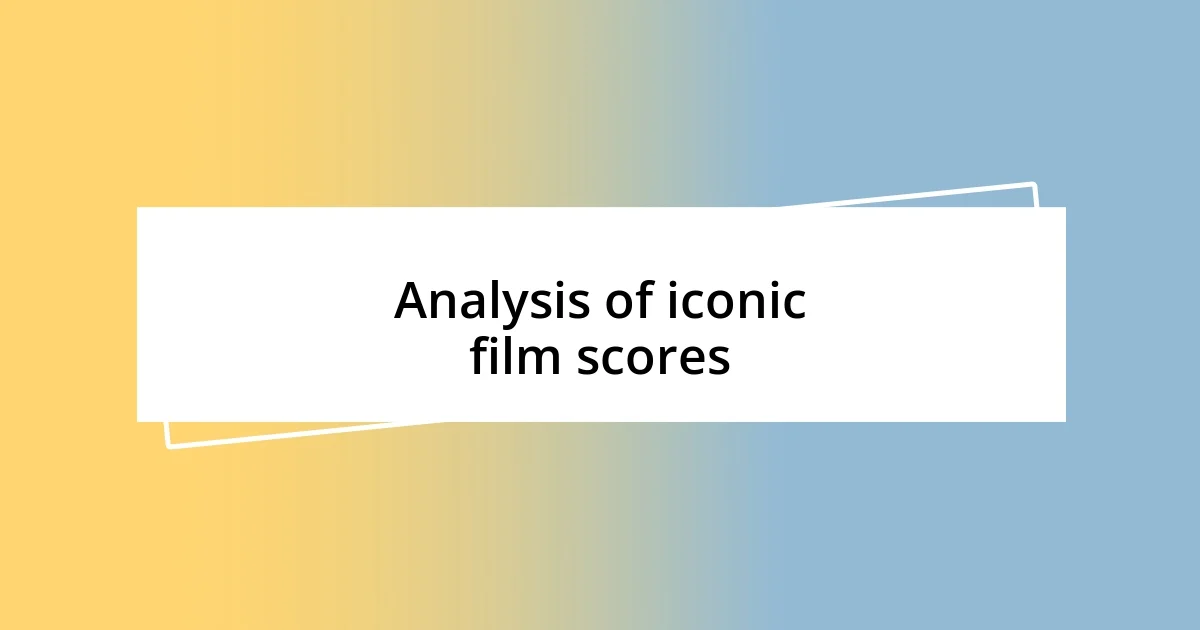
Analysis of iconic film scores
When analyzing iconic film scores, I can’t help but reflect on how they weave into the fabric of storytelling. Take “Inception,” for instance. Hans Zimmer’s use of the brass section creates an urgency that drives the plot’s intricate layers. Every time I hear those sweeping horns, I feel as if I’m being pulled deeper into the dream world alongside the characters, a perfect embodiment of the film’s complex narrative.
Another score that strikes a chord with me is from “The Godfather.” The haunting melody played by the strings is unforgettable, isn’t it? I often find myself reminiscing about the scenes it underscores—moments of family loyalty and moral conflict. It teaches me that a well-crafted score carries emotion that transcends dialogue, connecting deeply with the audience through its somber tones.
Consider the whimsical themes of “Amélie.” It’s fascinating how Yann Tiersen’s music mirrors the quirky spirit of the film. Each playful piano note transports me to the charming streets of Paris, evoking feelings of nostalgia and joy. Isn’t it remarkable how a soundtrack can transform a cinematic experience into something so personal and evocative? It’s this emotional connection that makes iconic film scores truly unforgettable.
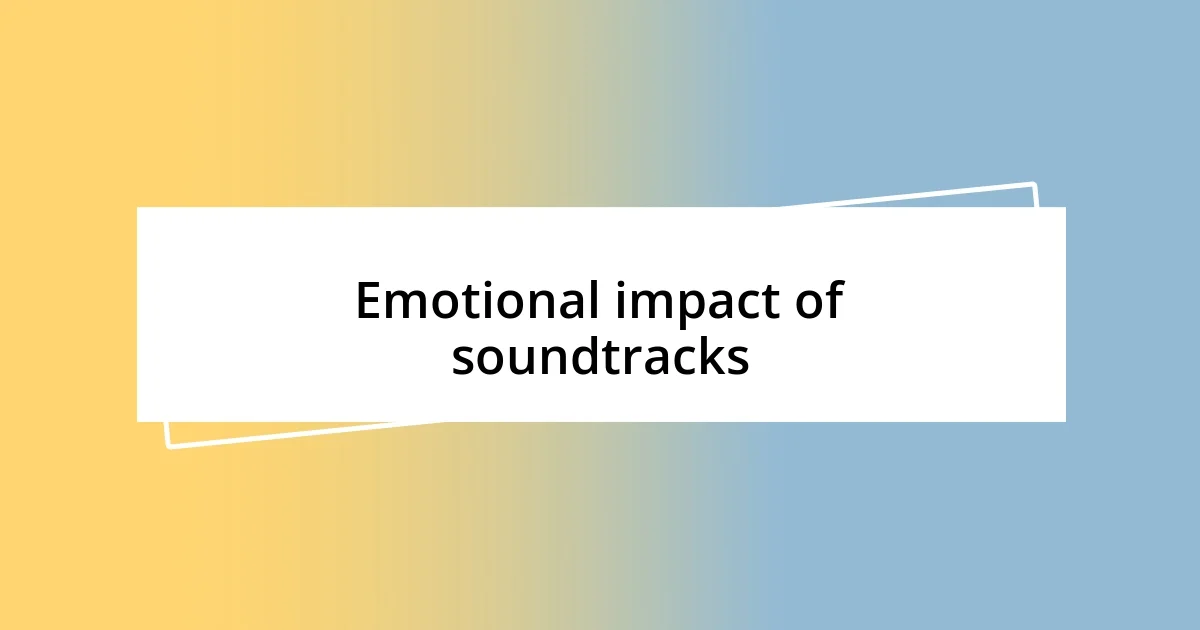
Emotional impact of soundtracks
The emotional impact of soundtracks can’t be overstated; they often shape our very feelings while watching a film. I remember the first time I heard the score from “The Shawshank Redemption.” The melancholic piano notes stirred something deep within me, making the protagonist’s journey of hope and resilience resonate on a personal level. Have you ever noticed how certain melodies linger long after the credits roll, like a bittersweet memory? That’s the power of music in film.
When a soundtrack perfectly matches the tone of a scene, it can elevate the emotional stakes significantly. For instance, the heart-wrenching orchestral swells in “Schindler’s List” truly encapsulate the gravity of the story, urging me to confront the horrors of history. I often find myself wiping away a tear, feeling the weight of each note as it underscores the tragedy unfolding on-screen. Isn’t it incredible how a few carefully arranged instruments can evoke such a profound response?
I’ve often marveled at how a soundtrack can define my mood even on a bad day. Listening to the upbeat tracks from “Guardians of the Galaxy” brings an instant sense of joy and adventure, lifting my spirits in a way that simple dialogue can’t match. Music has a unique ability to speak to our emotions, don’t you think? It’s this seamless intertwining of sound and story that makes film soundtracks an irreplaceable aspect of cinematic storytelling.
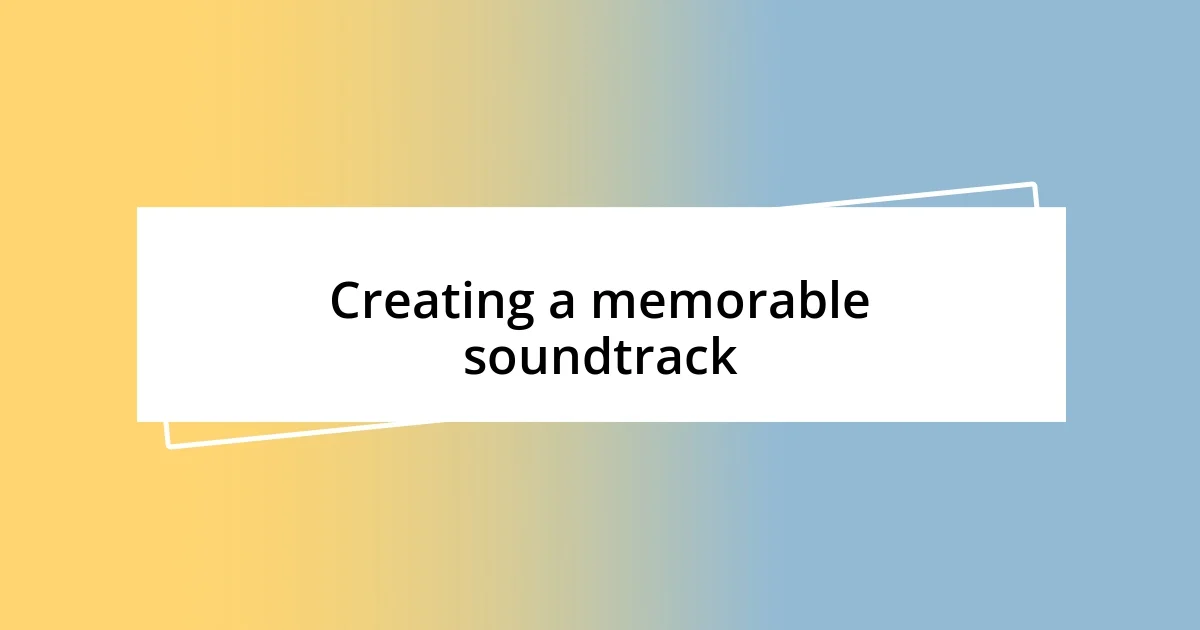
Creating a memorable soundtrack
Creating a memorable soundtrack often begins with a clear vision of the film’s emotional landscape. I remember watching “Interstellar” for the first time; Hans Zimmer’s score perfectly underscored the vastness of space while echoing human emotions. Those deep, resonant notes during the scenes of exploration made me feel the characters’ isolation and determination, all at once. Have you ever caught yourself holding your breath during a particularly intense score? That’s the magic of thoughtful musical construction.
The collaboration between directors and composers is crucial in crafting a standout soundtrack. When I think about “The Lion King,” Elton John’s melodies paired with Tim Rice’s lyrics created a legacy that still resonates today. Each song not only tells a story but also ingrains itself in our memories, captivating audiences across generations. I ponder—what is it about those tunes that invokes such nostalgia? Perhaps it’s the way they intertwine with the visual narrative, creating a holistic experience I long to revisit.
Creating a unique musical identity for a film can also set it apart from countless others. The quirky sounds of the score in “Fantastic Beasts and Where to Find Them” immediately transport me to the enchanting world of magic. I could almost feel the flutter of magical creatures! Isn’t it interesting how sound can build a world before a single frame is even shown? That’s how a well-conceived soundtrack doesn’t just accompany a film; it becomes an integral character within its story.
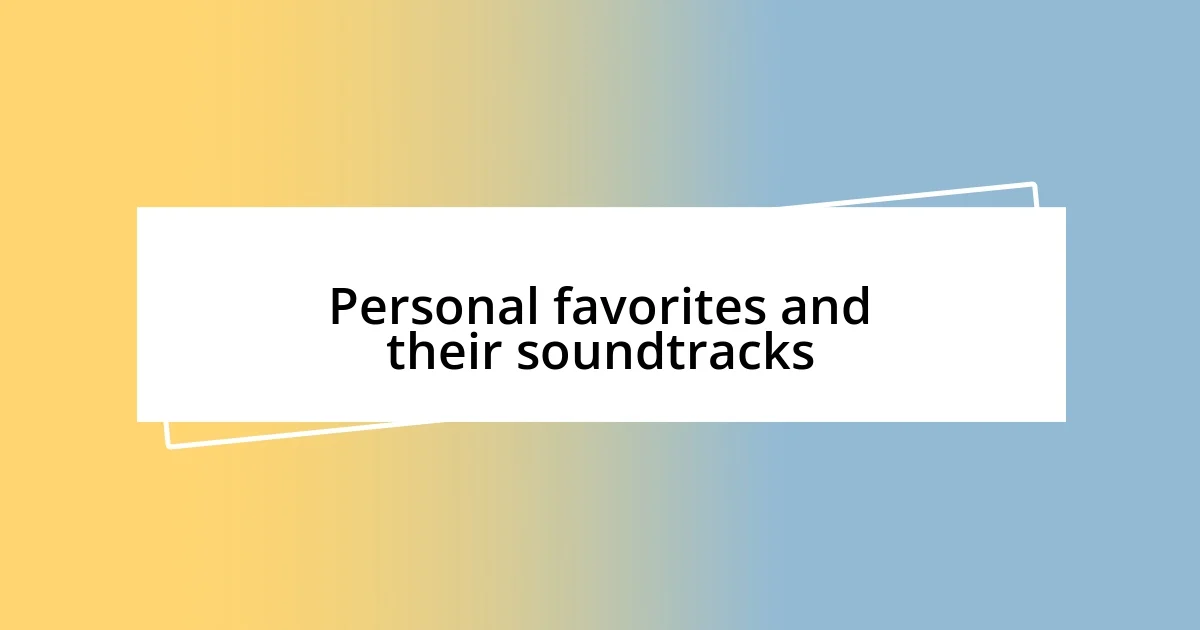
Personal favorites and their soundtracks
There are certain films in my collection that wouldn’t feel complete without their soundtracks. For instance, the haunting melodies in “Inception” warp my sense of time and reality every time I watch it. I remember being so captivated by Zimmer’s use of brass and strings that I found myself replaying the soundtrack on loop, immersing myself in that dreamlike atmosphere. Have you ever found a song that makes you feel like you’re part of another world? That’s how I felt, and it’s a feeling I keep chasing.
Take “The Greatest Showman,” for example. The electrifying energy of its songs fuels my motivation in everyday life. I recall a particularly tough week when I put on “This Is Me” and felt an immediate surge of confidence wash over me. It became my anthem for self-acceptance. Isn’t it fascinating how music can be the spark that ignites our inner strength? Each time those powerful notes hit, I’m reminded that stories, both on and off-screen, are meant to be celebrated.
Another favorite of mine is “Amélie,” which features a whimsical score that perfectly captures the essence of the film. I can still picture myself smiling ear to ear during the opening credits. The playful accordion tunes dance through my mind, creating a connection to the charming Parisian streets. It leaves me pondering: doesn’t music have an extraordinary ability to transport us to different times and places? That charming score doesn’t just complement the film; it transforms my entire viewing experience into something truly memorable.












